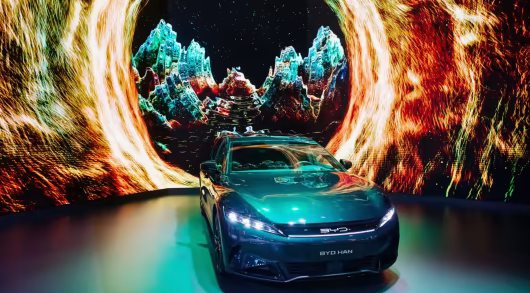The most developed in the world, but the Chinese auto industry is facing a serious bottleneck, the big man spends money to “rescue” himself.
- Tram Ho
Not enough ships for China’s auto exports
For China, the expansion of domestic vehicle transportation capacity is seen as crucial to the development and global footprint of the auto industry. However, international ocean freight is facing an urgent situation: lack of shipping capacity and poor logistics connectivity, becoming obstacles to the globalization process of Chinese automakers.
The urgency of the lack of shipping capacity has become particularly acute as China’s auto exports have skyrocketed over the past two years. According to Chinese customs statistics, the export value of vehicles in the third quarter of 2022 was 12.7 billion USD, more than 5 times higher than the same period in 2020. However, over the same period, the growth in The capacity of car carriers lags far behind, according to data from transit provider Clarksons, cited by Bloomberg.

According to automotive logistics company Changjiu Logistics, out of about 750 auto carriers operating worldwide, China currently only operates a fleet of 10 ships capable of undertaking long-distance maritime journeys. . As a result, Chinese carmakers struggle to find space on ships to send their vehicles to overseas markets.
According to the state-run news agency Xinhua, as auto exports soar, even a single delivery spot on auto carriers is hard to find. The companies that have won such positions on board have been charging so high prices that manufacturers face huge barriers to exporting.
Chinese carmakers are becoming shipping companies
Electric vehicle giant BYD has spent a lot of money to rescue itself from a severe train shortage. This electric car company has ordered its own fleet of car transporters and may become an official transport service provider in the near future.
Having achieved huge sales in the past year and actively promoting in overseas markets, BYD has ordered at least 6 large car carriers, which can transport thousands of cars at the same time. This move by BYD reflects deep disappointment in the Chinese auto industry. Over the past two years, as China’s auto exports have boomed, the supply chain related to the pandemic has suffered, leading to shortages of space on cargo ships.

Photo: FT
Now, BYD appears to be maneuvering not only to ship its own products, but also to provide global shipping for other automakers. BYD has made no public statements about its foray into shipping, but a recent update of the company’s information on Tianyancha, the Chinese database of companies, has not been made public. Quoc has provided some clues about this.
According to an update last month, BYD Auto Industry, a subsidiary of the BYD group, has expanded the scope of its commercial activities. This includes activities that are not normally associated with the car manufacturer: ocean carrier operations, freight forwarding, international shipping agency services, and cargo handling at ports.
The Tianyancha update shows that BYD is looking to establish a foothold in the global shipping sector. Not only that, the company is working to establish its dominance in the automotive supply chain and vertically integrate it from production to shipping to consumers.
BYD has been honing its vertical integration strategy over the years, starting out as a maker of mobile phone batteries before making other electronics, automotive components, and eventually electric vehicles. The company quickly gained a strong foothold in the market.
“BYD has mastered the core technologies of the entire new energy vehicle industry chain such as batteries, engines and electronic control,” Wang Chuanfu, president of BYD previously shared with the media.
BYD is currently looking to buy lithium mines in Africa and has won a contract to mine lithium in Chile because lithium is an integral component of electric vehicle batteries. BYD has become a leading maker of electric vehicle batteries, even supplying competitors like Tesla and Toyota, and is expanding battery production capacity from around 285 GWh in 2022 to an estimated 445 GWh in Last year.
“BYD is probably the most vertically integrated automaker,” said Lei Xing, a US-based automotive analyst. There’s no way to move to more efficient vertical integration than buying your own ship… And it’s no wonder BYD has become the supplier they can ship to even competitors.”
In fact, BYD is not the only Chinese automaker involved in the transportation sector. Last July, SAIC Motor, a state-owned car manufacturer, teamed up with Chinese shipping giant COSCO and port operator Shanghai International Port Group to form Guangzhou Yuanhai Auto Transport Company.
According to Bloomberg, QZ
Source : Genk
